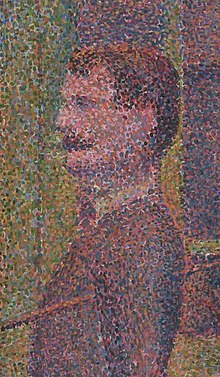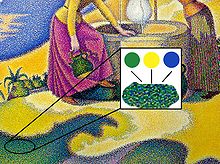Pointillism
Pointillism is a way of painting in which small separate dots of pure color are used to form images. The artist paints the picture with hundreds of tiny dots, mainly of red, yellow, blue and green, with white. The eye and mind of the viewer mix the colours to make different shades of these colours, as well as orange, purple, pink, and brown depending on the way the dots of colour are arranged.


Georges Seurat, at first an Impressionist painter, and Paul Signac, developed this technique in 1886. Other important artists were Camille Pissarro and, in some paintings, Vincent van Gogh. Art critics who saw their work, laughed at it and called it "Pointillism" as an insult. This name is still used, but is no longer thought of as an insult.[1]
Traditionally, artists blend pigments (mix colours) on a palette.[2] Pointillist painters do not mix the colours on the palette at all – they just use the colours straight from the tube. Traditional painters, and also impressionist painters, use many types of brushstrokes, and many textures of paint. The surface of the painting may have flat colour, lines, squiggles and dabs of paint. In a pointillist painting, every part of the picture is done in tiny dots, and most of the dots are about the same size. Pointillism is usually done in oil paints, because they are thick and do not run into each other when they are painted on the canvas.[3]
Printing and television
changeMany colour printers and large printing presses use four colours to print in tiny dots of cyan (blue), magenta (red), yellow, and black. Televisions and computer monitors use a similar technique to show many different colors using only red, green, and blue.
Music
changeThe name Pointillism is also given to a style of 20th-century music. Different musical notes are made separately from each other, giving a sound texture similar to pointillism.[4] This type of music is also known as "punctualism" or "klangfarbenmelodie".
Gallery
change-
Artist's models in the studio, Seurat (1887)
-
Harvesting Hay, Pissarro (1887)
-
The Palace of the Popes at Avignon, Signac (1900)
-
A village in Holland, Paul Baum (1905)
-
Vincent van Gogh, Self Portrait, 1887, using pointillist technique.
-
Maximilien Luce, Morning, Interior, 1890, using pointillist technique.
Related pages
changeReferences
change- ↑ Pointillism. 2007. Artcyclopedia. Artists by Movement. John Malyon/Artcyclopedia. Web. [1]
- ↑ palette = board on which paint is mixed
- ↑ "Nathan, Solon. 2010. Pointillism materials". Archived from the original on 2009-10-19. Retrieved 2010-11-29.
- ↑ Britannica - The Online Encyclopedia http://www.britannica.com/